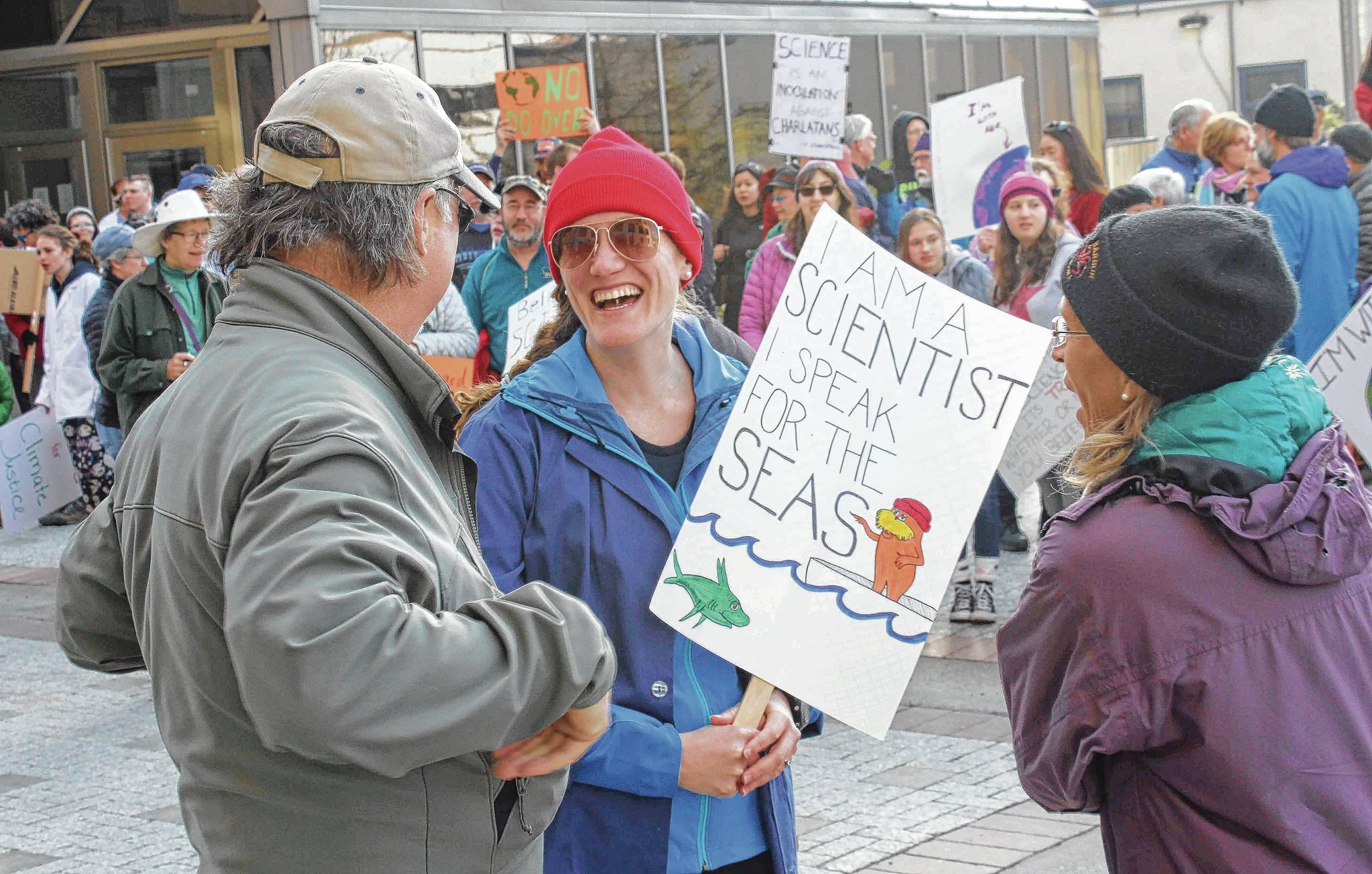Roman Motyka addressed a crowd in front of the Alaska State Capitol on Saturday morning, gathered there for Juneau’s March For Science.
Motyka, a Professor Emeritus with the Geophysical Institute at the University of Fairbanks, was localizing a global issue.
“The melting of the Alaska glaciers is just the tip of the iceberg,” Motyka said. “What is happening in Alaska is happening worldwide.”
That was one of the overarching themes of Saturday’s March For Science, meant to be a celebration of science and a statement about the importance of science and research in society. Juneau’s event was one of more than 600 confirmed marches in cities across the globe.
Some 300 people crowded in front of the Alaska State Capitol at 9 a.m. Saturday, showing off signs equipped with puns (“Science gives my life porpoise”) or with quick, simple messages (“Believe in science” or “#earth”). Motyka was one of five speakers, including Mining and Clean Water Coordinator at Southeast Alaska Conservation Council Guy Archibald, Assistant Professor at the University of Alaska Southeast Lora Vess, Rep. Justin Parish, D-Juneau, and Assistant Professor at University of Alaska Southeast Jim Powell.
There were numerous mentions and signs directed at local issues such as Motyka’s discussion of the Mendenhall Glacier’s recession. At the base of the capitol steps, marine biologist Tamsen Peeples stood in a white lab coat and holding a sign that said, “Kelp is on the way.”
Despite the wittiness of the sign, the motive behind the march was no joking matter for Peeples. Spending time outside and on the shores of Juneau, she grew up asking questions about the environment and turned it into a career. She’s been unhappy with national attitudes lately and wanted to show her support for the March for Science movement.
“It’s so frustrating to see media nationwide now disregarding everything I believe, in education and my lifestyle,” Peeples said, “so this is something that I’m here to really support.”
Alongside Peeples was Hillary Crenshaw, a local programmer. Though she doesn’t work in science, Crenshaw saw Saturday’s march as an important endeavor.
“I think it’s important to support fact and not fiction,” Crenshaw said, “and sometimes that requires getting up at 8 (a.m.) on a Saturday and making signs late into the evening, but it’s worth it.”
During the demonstration, many attendees filled out postcards to send to legislators. These cards carried both local and nationwide issues on them, depending on who would be receiving the card. After the speeches, the attendees marched to the Federal Building and mailed the postcards.
One of those legislators, Parish, was smiling through much of his address to the crowd. He was pleased to see such a large turnout, and repeatedly spoke about the effect that a large group can have. If they wanted to band together and get a candidate elected, they could do that. If they wanted to band together and be heard on a national scale about the importance of science, they could do that too.
Parish gave out his cellphone number during the speech, asking people to reach out to elected officials as much as they could to enact change.
“Everyone in this nation has a responsibility, a moral imperative,” Parish said, “to make sure that the government which we support, through our taxes, through our consent, the government that we made, by the people, is working for the people and is working for the future of mankind.”
Irene Morris, a longtime Earth Day advocate who was involved with organizing the march, was also beaming during the event. Wearing a cap that resembled a globe and carrying a sign that said, “I’m with Earth,” she was constantly on the move and chatting with other attendees. As she marched with others down Main St., Morris gleefully shared her view that the issue of protecting the world’s natural resources doesn’t come down to taking a political stand.
“This is wonderful,” Morris said, “and it’s non-partisan. It is. There is no politics in this thing.”
Some of the most effective words of the morning, however, came anonymously. Vess, a professor of sociology, posed the question of why science matters to her students. She asked them all to write a couple sentences about what’s important about science, and she closed with one student’s words that earned a hearty applause from the crowd.
“Science matters because it can aid us in creating a positive relationship and interconnectedness with the world,” Vess read. “Science challenges the mind and ego. It’s humbling and it’s beautiful.”
• Contact reporter Alex McCarthy at alex.mccarthy@juneauempire.com or 523-2271.

